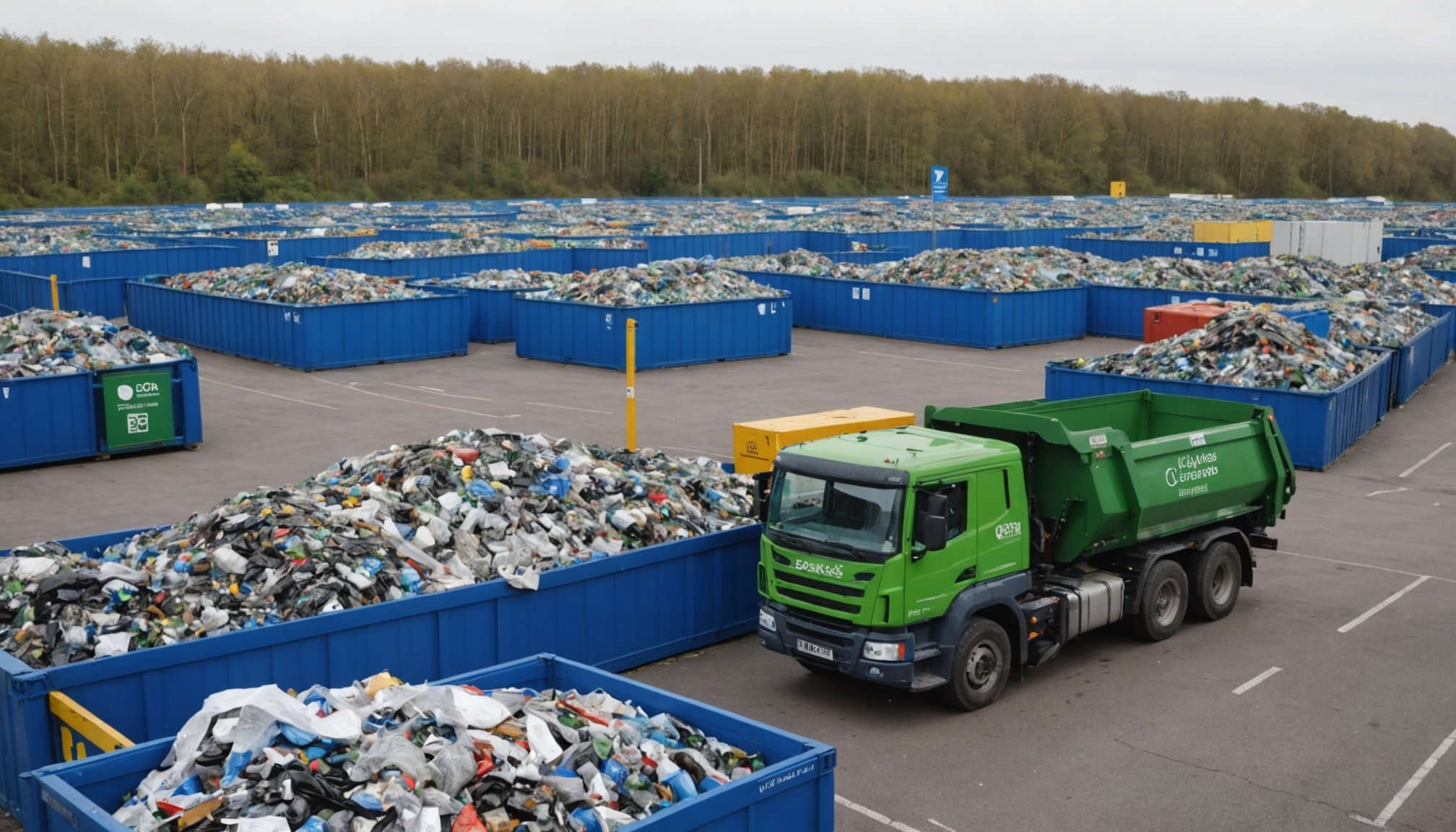Your Complete Blueprint for Launching a UK Recycling Center: Navigating Environmental Regulations with Ease
Understanding the Need for a Recycling Center
In the UK, the push towards a circular economy and achieving net zero emissions has never been more urgent. The government’s introduction of the Simpler Recycling legislation is a significant step in this direction, aiming to simplify and standardize recycling practices across England. If you’re considering launching a recycling center, you’re not only contributing to a more sustainable future but also tapping into a growing market demand.
“Preparing for Simpler Recycling legislation is crucial if the UK is going to transition to a truly circular economy,” notes David Gudgeon, Head of External Affairs at Reconomy. This legislation is designed to eliminate confusion, increase recycling rates, and improve circularity by creating a consistent approach nationwide[1].
Additional reading : Ultimate blueprint: a comprehensive step-by-step approach to kickstart your uk sme business consultancy
Navigating Environmental Regulations
Obtaining the Necessary Permits
Before you can start constructing your recycling center, you need to navigate the complex web of environmental regulations. In the UK, operating a household waste recycling center requires a standard rules permit from the Waste Disposal Authority, which could be a Unitary Authority or a local council.
To apply for this permit, your activity must meet the rules set out in the permit, and you must be able to manage the potential risks as outlined in the generic risk assessment. Here are the key steps and costs involved:
In parallel : Navigating UK Charity Commission Regulations: The Ultimate Handbook for Non-Profits
-
Application Costs:
-
£3,926 for a new standard rules permit application
-
£1,178 for a minor variation to the permit
-
£2,529 to transfer the permit
-
£2,356 to surrender the permit
-
An annual subsistence charge of £1,109[2].
-
Permit Requirements:
-
Ensure your activity meets the rules set out in the permit.
-
Manage potential risks as set out in the generic risk assessment.
-
Comply with waste acceptance criteria, including only accepting waste of types listed in the rule and in Table 2.3[4].
Compliance with Waste Hierarchy and Management Plans
The Waste Framework Directive emphasizes the waste hierarchy, which prioritizes waste prevention, reuse, recycling, and recovery over disposal. Your recycling center must apply this hierarchy in its operations.
-
Waste Hierarchy:
-
Prevent waste generation.
-
Promote reuse.
-
Recycle and recover waste.
-
Ensure disposal is done in a manner that minimizes environmental impact[4].
-
Emissions Management:
-
Implement measures to prevent or minimize emissions not controlled by emission limits.
-
Develop and implement approved emissions management, dust management, and odour management plans if necessary[4].
Setting Up Your Recycling Center
Choosing the Right Location
The location of your recycling center is critical for its success. Here are some factors to consider:
- Accessibility: Ensure the site is easily accessible for both household and commercial waste collection vehicles.
- Environmental Impact: Choose a location that minimizes the environmental impact, such as avoiding areas prone to flooding or near sensitive ecosystems.
- Local Authorities: Work closely with local authorities to ensure compliance with local regulations and to gain community support.
Infrastructure and Equipment
Your recycling center will need various infrastructure and equipment to handle different types of waste effectively.
- Waste Sorting Facilities: Invest in sorting machines and manual sorting areas to separate materials like paper, cardboard, plastic, glass, and metal.
- Storage Facilities: Ensure adequate storage for different types of waste, including hazardous waste, which must be stored in compliance with specific regulations (up to 50 tonnes at any one time)[4].
- Collection and Transportation: Arrange for collection vehicles and logistics to transport waste to and from the recycling center.
Managing Different Types of Waste
Household Waste
Household waste is a significant component of the materials you will handle. Here’s a detailed look at what you can expect:
-
Recyclable Materials:
-
Plastic bottles, pots, tubs, and trays
-
Steel and aluminium cans
-
Glass bottles and jars
-
Paper, cardboard, and cartons
-
Food waste, including tea bags, coffee grinds, and peelings[3][5].
-
Non-Recyclable Materials:
-
Broken glass, mirrors, and drinking glasses
-
Metal kitchenware, tools, and large appliances
-
Textiles other than wearable clothes and shoes
-
Hazardous waste like batteries, syringes, and gas canisters[3].
Commercial and Industrial Waste
Businesses and industries generate a variety of waste that your recycling center can manage.
- Dry Recyclables: Separate collection for paper, cardboard, plastic packaging, glass, and metal.
- Food Waste: Separate collection for any quantity of food waste generated by businesses.
- Hazardous Waste: Proper handling and storage of hazardous materials, adhering to the 50 tonnes per day treatment limit and 50 tonnes storage limit[1][4].
Educating and Engaging Your Community
Public Awareness and Education
Educating the public on what can and cannot be recycled is crucial for the success of your recycling center.
- Clear Guidelines: Provide clear guidelines on what materials are accepted and how they should be prepared (e.g., rinsing, squashing, and removing lids).
- Community Outreach: Engage with local communities through workshops, leaflets, and online resources to ensure everyone understands the new recycling practices.
- Collaboration with Local Authorities: Work with local authorities to integrate your recycling center into existing waste management systems and to promote the service through their channels[1][3].
Practical Tips for Your Recycling Business
Preparing Your Business for Simpler Recycling
If you’re already in the waste management business, here are some practical tips to prepare for the Simpler Recycling legislation:
- Assess Your Supply Chain: Look at the materials coming into your business and assess your upstream supply chains. Consider alternative product packaging to make recycling easier.
- Educate Your Staff: Ensure your staff are well-educated on the new recycling practices and their roles in implementing them.
- Consult Your Waste Provider: Engage early with your waste provider to make necessary changes and ensure compliance with the new regulations[1].
Financial and Operational Considerations
Starting a recycling center involves significant financial and operational considerations.
- Initial Investment: Calculate the initial investment needed for infrastructure, equipment, and permits.
- Ongoing Costs: Plan for ongoing costs such as staff salaries, maintenance, and operational expenses.
- Revenue Streams: Identify potential revenue streams, including the sale of recycled materials and services offered to businesses and households.
Case Study: Somerset Council’s Recycling Program
Somerset Council’s recycling program is a good example of how effective recycling can be implemented at a local level.
- Detailed Collection Guidelines: Somerset Council provides detailed guidelines on what items are collected in each recycling bin, including plastic bottles, tins and cans, glass bottles, and food waste[3].
- Community Engagement: The council engages with the community through online resources and service guides, ensuring that everyone knows their collection days and what materials are accepted.
- Special Collections: The council also offers special collections for items like small household batteries, electrical items, and textiles, which are not collected at the kerbside[3].: Building a Sustainable Future
Launching a recycling center in the UK is a complex but rewarding endeavor. By understanding and complying with environmental regulations, setting up the right infrastructure, managing different types of waste effectively, and engaging with your community, you can contribute significantly to the UK’s goal of achieving a circular economy and net zero emissions.
As David Gudgeon emphasizes, “There is a little under five months to engage, educate and energise everybody who produces and disposes of waste, so that they are compliant with the reforms.” By working together with local authorities, businesses, and the community, we can make recycling simpler and more effective, paving the way for a more sustainable future.
Table: Comparison of Waste Types and Acceptance Criteria
| Waste Type | Acceptance Criteria | Preparation Required | Collection Method |
|---|---|---|---|
| Plastic Bottles | Rinsed, squashed, caps back on | Remove pumps and trigger sprays | Curbside collection |
| Glass Bottles | Rinsed, metal and plastic tops back on | No broken glass | Curbside collection |
| Food Waste | All food waste, cooked or raw | No packaging | Separate food waste bin |
| Paper and Cardboard | Newspapers, magazines, leaflets, directories | No need to remove windows | Curbside collection |
| Metal Cans | Rinsed, squashed if safe | Loose lids inside cans | Curbside collection |
| Hazardous Waste | Specific types only, e.g., batteries, WEEE | Proper handling and storage | Special collections |
Detailed Bullet Point List: Steps to Launch a Recycling Center
-
Research and Planning:
-
Understand local and national regulations.
-
Conduct market research to identify demand.
-
Develop a comprehensive business plan.
-
Permitting and Licensing:
-
Apply for the necessary permits.
-
Ensure compliance with waste hierarchy and management plans.
-
Infrastructure Setup:
-
Choose an appropriate location.
-
Invest in sorting machines and storage facilities.
-
Arrange for collection and transportation services.
-
Community Engagement:
-
Provide clear guidelines on what materials are accepted.
-
Engage with local communities through outreach programs.
-
Collaborate with local authorities.
-
Operational Management:
-
Educate staff on new recycling practices.
-
Manage different types of waste effectively.
-
Monitor and report on environmental impact.
-
Financial Management:
-
Calculate initial and ongoing costs.
-
Identify revenue streams.
-
Plan for long-term sustainability.
By following these steps and staying informed about the latest regulations and best practices, you can successfully launch and operate a recycling center that contributes to a more sustainable UK.











